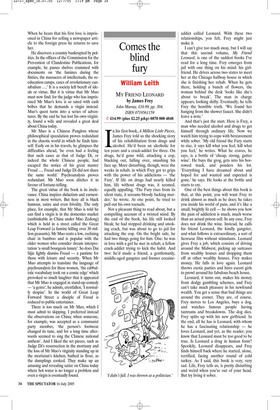Comes the blind fury
William Leith
MY FRIEND LEONARD by James Frey John Murray, £16.99, pp. 304, ISBN 0719561159 ✆ £14.99 (plus £2.25 p&p) 0870 800 4848 In his first book, A Million Little Pieces, James Frey told us the shocking story of his rehabilitation from drugs and alcohol. He’d been an alcoholic for ten years and a crack-addict for three. On drugs, he’d gone wild, attacking a cop, blacking out, falling over, smashing his face up. More disturbing, though, were the weeks in rehab, in which Frey got to grips with the power of his addictions — ‘the Fury’. If life on drugs had nearly killed him, life without drugs was, it seemed, equally appalling. ‘The Fury rises from its silent state, it screams bloody fucking murder,’ he wrote. At one point, he tried to pull out his own toenails.
Not a pleasant thing to read about, but a compelling account of a twisted mind. By the end of the book, his life still looked bleak; he had stopped drinking and smoking crack, but was about to go to jail for attacking the cop. On the bright side, he had two things going for him. One: he was in love with a girl he met in rehab, a fellow crack-addict trying to kick the habit. And two: he’d made a friend, a gentlemanly, middle-aged gangster and former cocaine addict called Leonard. With these two relationships, you felt, Frey might just make it.
I can’t give too much away, but I will say that this second volume, My Friend Leonard, is one of the saddest books I’ve read for a long time. Frey emerges from jail with one thing on his mind: his girlfriend. He drives across two states to meet her at the Chicago halfway house in which she is finishing her rehab. When he gets there, holding a bunch of flowers, the woman behind the desk ‘looks like she’s about to break’. The man in charge appears, looking shifty. Eventually, he tells Frey the horrible truth. ‘We found her hanging from the shower faucet. She didn’t leave a note.’ And that’s just the start. Here is Frey, a man who needed alcohol and drugs to get himself through ordinary life. Now we watch him trying to cope with bereavement while sober. ‘My old friend the Fury starts to rise, it says kill what you feel, kill what you feel,’ he writes. What he craves, he says, is a bottle of ‘cheap, strong, gutter wine’. He buys the grog, gets into his borrowed truck, and ponders his lot. ‘Everything I have dreamed about and hoped for and wanted and expected is gone,’ he says. He looks at the bottle and starts to cry.
One of the best things about this book is that, at this point, you will want Frey to drink almost as much as he does; he takes you inside his world of pain, and it’s like a small, brightly lit cell — he shows you how the pain of addiction is much, much worse than an actual prison cell. In any case, Frey does not drink the wine. Instead, he calls his friend Leonard, the kindly gangster, and what follows is extraordinary, a sort of Scorsese film without stimulants. Leonard gives Frey a job, which consists of driving around the Midwest, picking up suitcases from wealthy houses and dropping them off at other wealthy houses. Frey makes money. He falls in love again. Leonard throws exotic parties and hires escort girls to prowl around his fabulous beach house.
Leonard, it turns out, makes his money from dodgy gambling schemes, and Frey can’t take much pleasure in his newfound wealth. You get a sense that bad things are around the corner. They are, of course. Frey moves to Los Angeles, buys a dog, and watches famous people having tantrums and breakdowns. The dog dies. Frey splits up with his new girlfriend. In the end, all he has is Leonard, with whom he has a fascinating relationship — he loves Leonard, and yet, as the reader, you know that Leonard must be too good to be true. Is Leonard a drug in human form? Spookily, Leonard disappears, and Frey finds himself back where he started, alone, terrified, facing another round of cold turkey. As I said, this book is very, very sad. Life, Frey tells us, is pretty disturbing and weird when you’re out of your head. But try living it sober.


























































 Previous page
Previous page